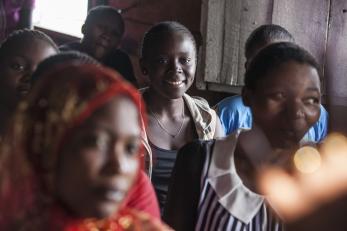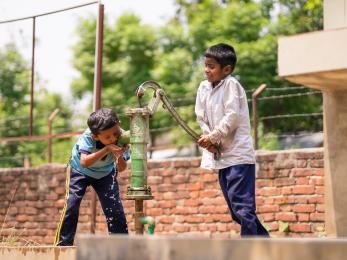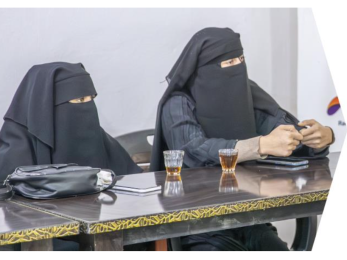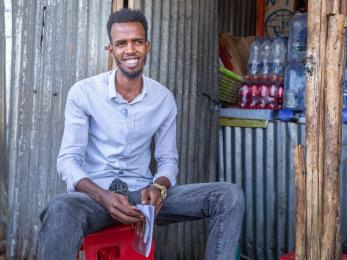Youth Development Sector Approach

Implementing Our Approach
The Youth Transformation Framework™ (YTF) enables a comprehensive approach to youth development at each step of the programming process. The YTF captures the cause and effect relationships between change in youth’s internal and external environment (program outcomes), and greater development during adulthood (long-term impact on peace, productivity and justice). Such a holistic view of youth needs “blueprint” established from research can be used as a frame of reference to: 1) assess the situation across sectors through youth lenses; 2) design programs based on priorities highlighted during the assessment; 3) select appropriate implementing tools (e.g.: curriculum, methodology, etc); and 4) monitor and evaluate results over time. Although the systematic progression of the approach is recommended, the YTF can be used at any step to train staff, communicate with donors or brainstorm ideas thereby reducing risks of omissions and optimizing results in the long term.
Assessment
Mercy Corps believes in assessing youth issues across sectors by looking at two dimensions: the demand for capabilities (knowledge, skills, attitudes, behaviors); and the supply of opportunities (services, support, protection) available locally. The YTF describes 75 youth needs with detailed benchmarks into a professional diagnostic tool that covers both dimensions. Such tool provides a process for gathering and interpreting information on the situation of young people in their environment: We collect questionnaires from diverse stakeholders, use benchmarks to interpret data, and draw a score for each of the 75 needs. This systematic scoring system facilitates comparison across demographics and prioritization before program design.
Design
The 75 needs in the YTF capture the critical factors driving not only positive youth development, but also conflict prevention and economic development. Implementing program activities that directly affect unfilled needs in the YTF predictably leads to greater contribution to community development as young people transition to adulthood. Therefore, a comprehensive understanding of gaps between supply and demand across youth needs optimizes program design in light of the context in each community. Such complete picture helps donor and staff identify strategic targets as program goals (outcomes). Because the YTF integrates research findings across sectors/disciplines, youth programs can be designed with relative assurance of long-term impacts on peace, productivity and justice worldwide.
Implementation
In order to deliver transformational youth initiatives, Mercy Corps developed specialized curricula that reflect its core competencies in five subjects: 1)Global citizenship, 2)Life skills; 3)Negotiation and conflict management; 4)Psychosocial support; and 5)Social entrepreneurship. Each subject includes multiple lessons that can be implemented in various types of youth programs (e.g. sports, online connectivity, vocational training, etc.) separately or in blocks based on local needs and program objectives. Most lessons have been designed to minimize requirements for teaching qualification and use an activity-based learning approach to engage young people in the learning process. Each module for each subject stands on its own with guidelines for assessing learning and adaptation to local context:
- The “Youth Conflict Management” (YCM) curriculum provides an approach to conflict prevention and mediation. Based on the Program for Young Negotiators, which has been used to train over 20,000 young people in the United States, Canada, Argentina and Israel, the curriculum helps youth learn the interest-based negotiation methodology. Mercy Corps has used similar curriculum with youth in Timor Leste, Nepal, Kosovo and Central Asia and with larger populations in Iraq, Afghanistan, Indonesia, Sri Lanka, and West Bank/Gaza.
- The “Comfort for Kids” (C4K) curriculum on psychosocial support builds resiliency of children, youth and adults to foster family stability and the emotional support system needed for everyone to rebuild their life and society. C4K has trained over 10,000 professionals, paraprofessionals and parents in the United States, Latin America, China and Gaza in support of disaster or conflict affected children and youth.
- The “Global Citizenship” curriculum was used to inspire and educate thousands of young leaders in the United States, Scotland and Middle-East countries. Some lessons focus on cross-cultural understanding and empathy while others are more issue-based with processes to internalize information related to root causes and consequences of problems such as Conflict; Poverty/Hunger; Health/HIV-AIDS; Human Rights; Climate Change/Water; Access to Education.
- The “Life Skills” curriculum includes multiple aspects of young people’s life and was implemented across multiple types of programming including sports for development in Africa and schools in China.
- The “Social Entrepreneurship” curriculum builds on Mercy Corps’ strategy around market-driven and community-based development by engaging young people to identify market needs in their community and define concrete plans for addressing them in a sustainable manner. Through the process, young people develop management skills required to allow individual and collective ownership for building secure, productive and just communities. Mercy Corps also provides guidance through participatory industry value chain analysis to align local projects with income generating opportunities.
Pedagogy - These lessons are designed as student-centered inquiry based activities in which students develop questions about global issues based on their own interests. For this method to succeed, students are encouraged to share their ideas openly and freely, so that they can have an opportunity to reflect on their own knowledge and opinions, and those of their peers. These lessons also employ cooperative learning, in which students are responsible for working collaboratively with a group of peers and independent of immediate direction from teachers. In addition, students will use their peers as resources to explore opinions and ideas from various perspectives in a forum that encourages open debate.
To transform awareness into understanding, knowledge into skills, and actions into social impact at the local and global levels, however, an emotional connection with the world must be created throughout the learning continuum. That is the power of deep interactions youth-to-youth and youth-to-community. When young people feel the value of their new knowledge and are rewarded emotionally for the progress they made, the learning process deepens and sticks longer. This can happen through community service projects (service learning) or learning-by-doing (experiential learning) which Mercy Corps favor through its activity-based lessons. Innovations in Information, Communications and Technologies (ICT) have also made possible relationship building and empathy among peers of diverse cultures which create new opportunities for global engagement.
Monitoring and Evaluation (M&E)
In addition to standard indicators used to monitor outputs, Mercy Corps measures the change in youth capabilities such as knowledge, skills, attitudes and behaviors using a well defined pre- and post-test with numerical values to facilitate analysis. The cause and effect relationship between change of attitudes and behaviors during adolescence and life outcomes during adulthoods (defined as a better contribution to self and society and lower engagement in violence) has been well established through longevity studies in the United States . Based on these results and research findings from Mercy Corps’s Youth Transformation Framework, we designed different indexes that measure change in knowledge, skills, attitudes and behaviors for different subjects such as Global Citizenship, Conflict Management, Life Skills and Psychosocial Support. These research-based indexes suggest that a small percentage increase today will lead to more productive citizens tomorrow, resulting in greater peace, productivity and justice. Most importantly, these composite indicators allow program managers of each country to compare and analyze results across locations. Finally, the baseline scores established through the youth diagnostic tool during the assessment can also be used to evaluate change in access to opportunities. Using these qualitative and quantitative evaluative processes, Mercy Corps is able to monitor, evaluate and report results to ensure continuous improvements and accountability.
Youth Transformation Online – Reaching Scale
Global Citizen Corps (GCC) is a multi-country leadership program that uses online engagement and community actions to address multiple needs across the Youth Transformation Framework at scale. Through digital-stories, structured dialogues across continents, and leadership opportunities, young people discover peaceful ways to learn, communicate and contribute. Now in its seventh year, www.globalcitizencorps.org uses a web 2.0 portal that aggregates educational and user-generated content from mobile and other digital media into a single, youth-friendly platform. These tools offer a powerful avenue for mobilizing others to take actions worldwide. Every year, over 3,000 trained GCC Leaders in eight countries mobilize more than 10,000 peers in their action projects and reach million others worldwide. The goal is to inspire and equip an expanding international network of young leaders to take informed actions that build secure, productive and just communities around the world.
Essentially, GCC Leaders develop an understanding of global issues from those directly affected, share with those who they motivate to act, and address problems collectively. Global citizenship education across countries allows diverse youth to build trusting relationships, explore cultural differences and find common ground around peaceful change in a process of “talk global and act local.” This program is part of a long-term strategy in the Middle East to rebuild the foundation for a knowledge-based transformation while reducing digital divides and social isolation.
The GCC program currently has physical presence in six countries to facilitate training, video conferences and youth gatherings. In the United States, two hubs were established to leverage the innovative museum-style “Action Centers to end World Hunger” www.actioncenter.org in New York City (near the 09/11 memorial), and in Portland (Oregon). Mercy Corps invested in global engagement to demystify international development and radically alter the way people think about the world and their role within it.
For a complete explanation of our sector approach, please see the documents below:


